
Starting As A Wedding Photographer
ShootDotEdit: To begin with, tell us a bit about how you started as a photographer?
Sara France: To be honest, I fell into it. I always knew that I wanted to have my own business. Even in college, I found an old interview where they asked, “what do you want to do?” And I replied, “I want to have my own business”, but I had no idea what I wanted to be. And I didn’t have any knowledge that I would be interested in photography. So it really didn’t happen until someone handed me a camera and I took some pictures and they said, “you should do this.” Luckily, I had a very natural eye and it came very easily to me.
I still worked full-time and really tried to do photography as a side hustle. I didn’t want to do the starving artist thing, so I still worked mostly full-time until probably five years into my business. When I first started, I was working in a firm selling large format printers. So I understood a lot about color and printing. It correlated, but I wanted to dive into the photo community and get involved. So I went and approached Pictage. I just thought what they were doing was so amazing because it was in 2001. I started working there as a customer service liaison with their top clients. That was the last thing I did before venturing out full-time.
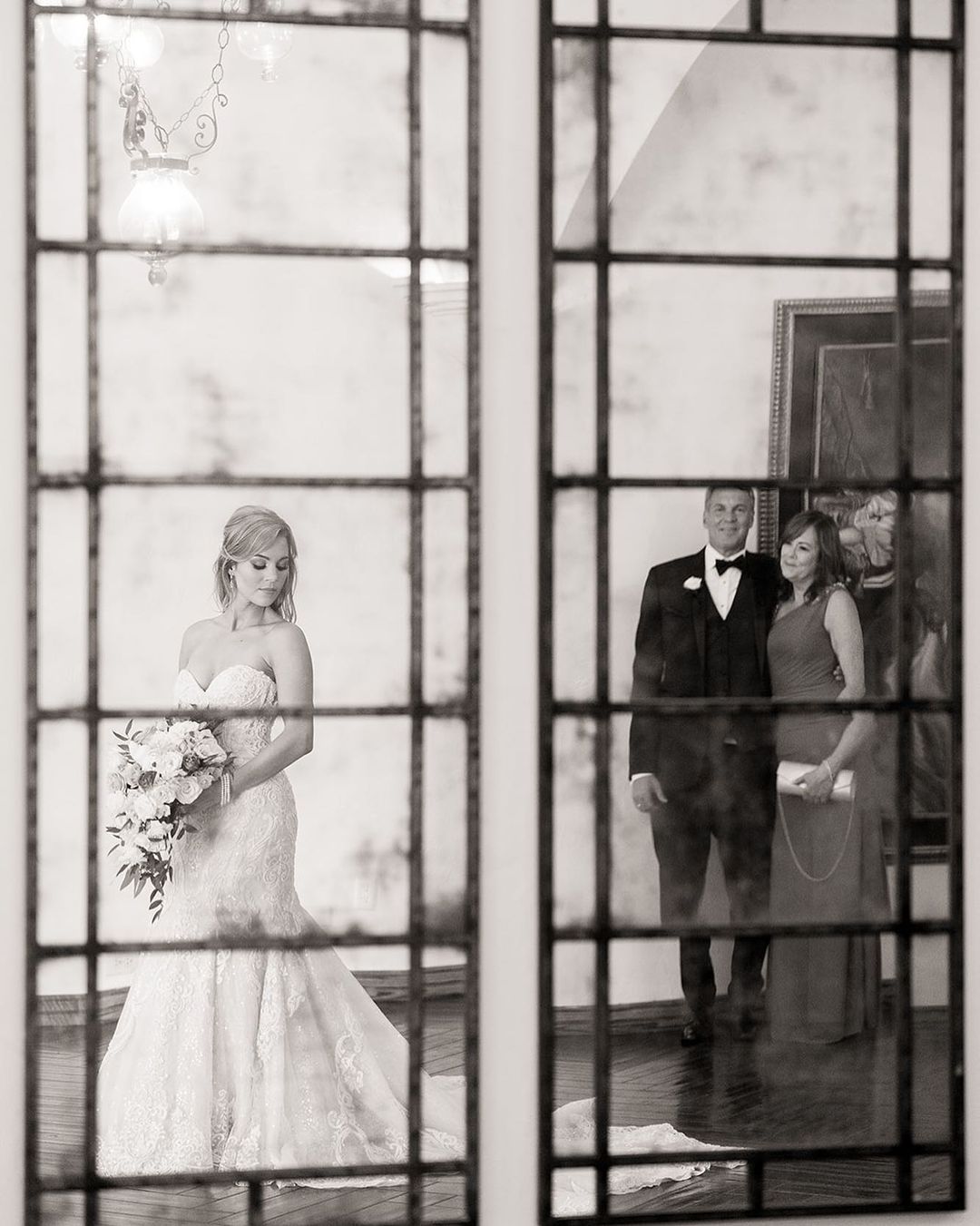
Image Courtesy: ShootDotEdit Customer @sarafrance
ShootDotEdit: Did you always know wedding photography was the direction that you wanted to move forward in or was it a bit of trial and error?
Sara France: It was wedding photography first out of the gate. Actually, it was a wedding photographer that I went to work for that handed me a camera officially, and I just loved her work and the way that she connected with her clients and the entire experience. And then I thought to try out a different kind of photography. So I went to shoot some landscapes in Ireland – I just wanted to go with someone who was photographing landscapes and see if I liked it. And before I even got on the plane, I met a wedding dressmaker and I just gravitated towards her. We started talking and so, on my landscape photography excursion, I ended up shooting wedding dresses in amazing empty ruins on the coast. It was one of the moments that sealed the deal. No landscape was interesting to me without someone in it. So I feel that’s when I knew that wedding photography was the direction that I wanted to move forward in.
Suggested Read: Finding Your Photography Style: Develop & Evolve At Your Own Pace
The Story Behind the Trifecta that is Sara France Photography, The Copper Collective, & Shay Studios
ShootDotEdit: That sounds like a fantastic start to your career! So when did you launch your own business?
Sara France: I started shooting in 2001 so it has been 20 years in the business so far. We started as France Photographers because we wanted to utilize my name. After all, people knew me and we wanted to give that credibility to the photographers I was adding to the team. However, putting your name on your brand is not something that I would recommend to other people who are starting a brand with multiple photographers, because it causes challenges down the road. We struggled through that so my shortcut for you is don’t do it! Pick a different name or start a sister company instead. I found that rebranding in 2019 has completely clarified the brands and made our whole setup so much better.
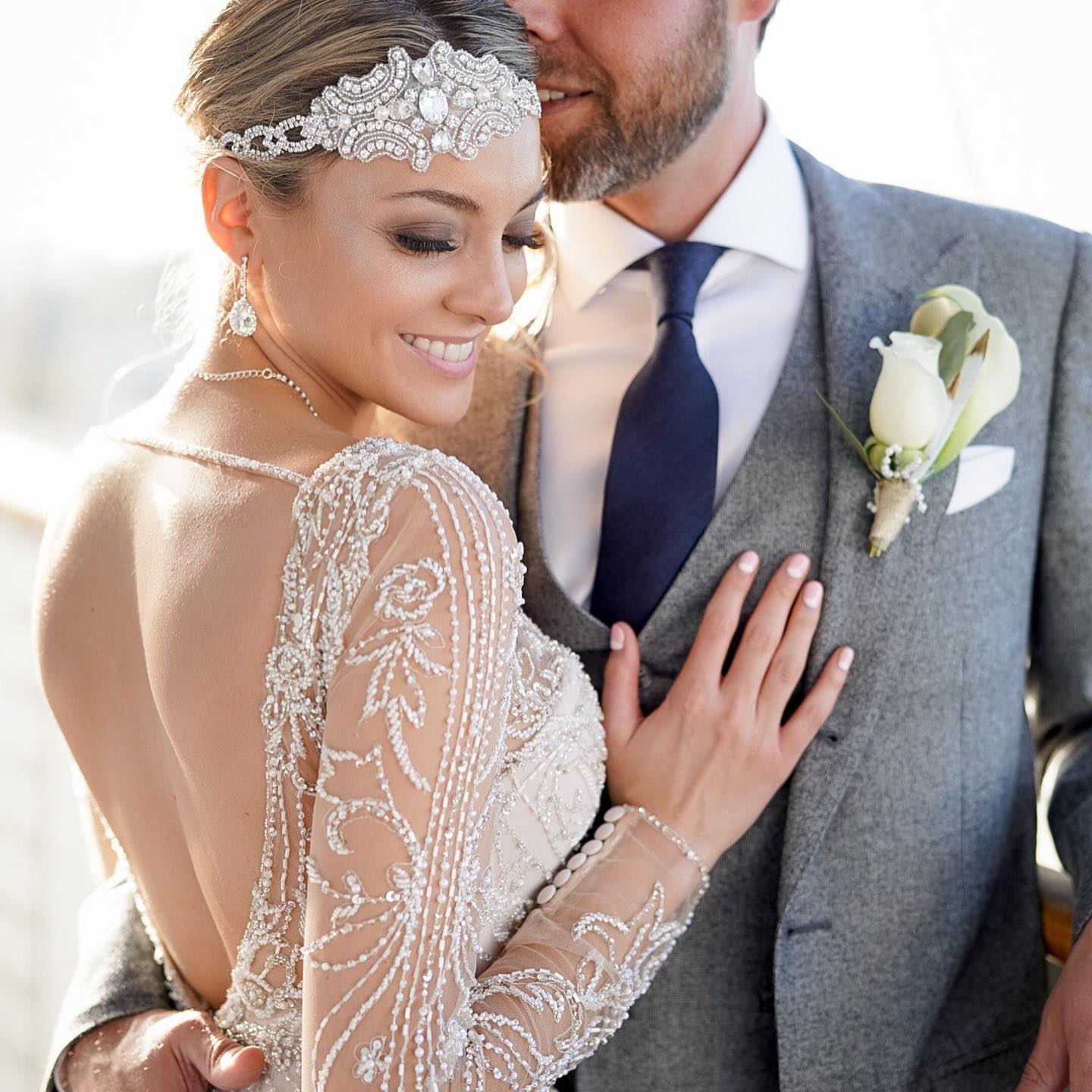 Image Courtesy: ShootDotEdit Customer @sarafrance
Image Courtesy: ShootDotEdit Customer @sarafranceShootDotEdit: Wow – 20 years! That’s a long haul for sure! Tell us about the most difficult challenge that you faced in those years and how you overcame it.
Sara France: The most difficult challenge was figuring out how to expand past me and the process of hiring and working with other people – trying to figure out what motivates them, how to sell other people’s craft, and how to set up processes that work. When people ask me about details, about having a business with multiple photographers, I dive in a lot on where their strengths are, what they want to do, what they want to focus on, and why they want to have a business with multiple photographers.
Honestly, I set up my brand with multiple photographers because it was something I was passionate about. It’s definitely not money-driven or driven by anything other than the excitement for me to continue to build a business and to share the knowledge and systems that I had with a very expansive and intimate setting. Being able to help photographers set up lives that they loved and help them with systems and processes and help them find the right people for the right positions is all part of it for me. Finding those employees/people is the hardest part, along with hoping that they are happy and they stay. It’s an ever-evolving process, but I got really lucky with my first hire, which was Jessica, and she has been with me now for almost 10 years. We’re celebrating her 10 years of shooting.
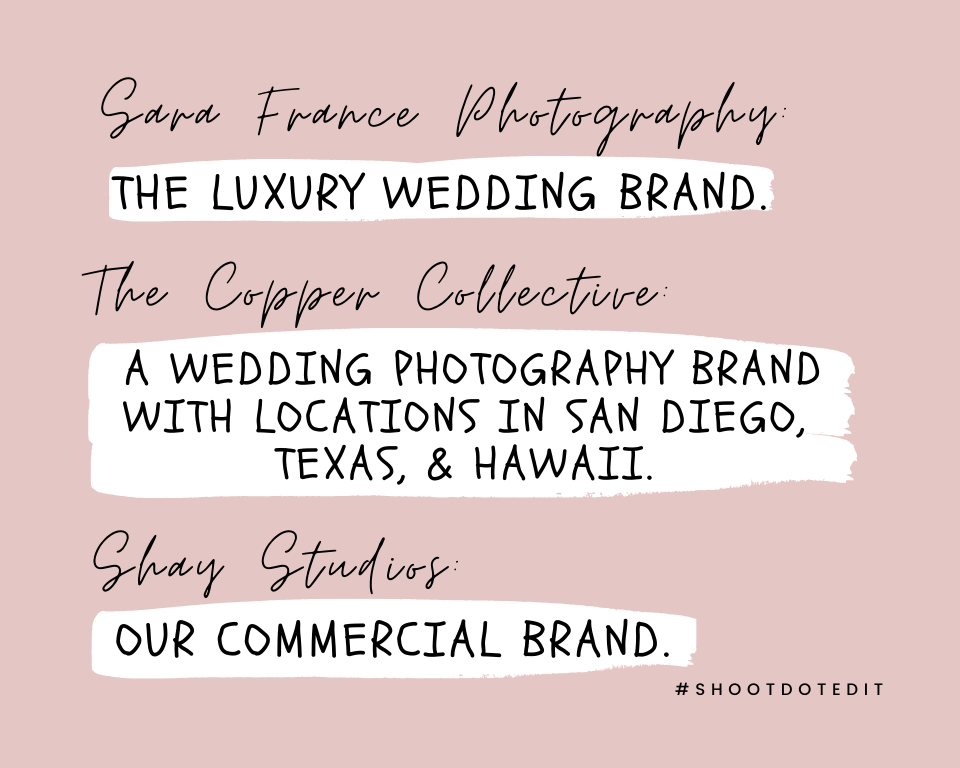
ShootDotEdit: Can you share more about your 3 businesses and their origin stories?
Sara France: We now have three brands. Sara France Photography, the luxury wedding brand, then we have The Copper Collective, a wedding photography brand with locations in San Diego, Texas, and Hawaii. And then we have Shay Studios, which is our commercial brand.
ShootDotEdit: What led to the formation of Shay Studios? Can you tell us more about the brand?
Sara France: I had been shooting commercial work for probably 15 years at least. I’ve worked for Apple, United, a lot of really big names but also small companies. So I was doing commercial photography but didn’t have a home for it (online). So, when people wanted to hire us for it, we had a separate page where they could go to see commercial examples. But then we decided to make it its own brand and soft launch. We really worked to define the brand. Now it has its own Instagram, website, all of it. And honestly, during the pandemic, that clarification and also that business was a lifesaver because we were able to keep shooting commercial projects when we couldn’t do weddings. So we focused on Shay Studios, and our business expanded on that side a ton. We were able to shoot products shipped to us, we could do bigger studio shoots and still keep social distancing. We were still able to work around a lot of the restrictions (safely) as a photography studio. And it has provided a lot of opportunities for us. So now, we shoot weddings on the weekends and commercial jobs mostly during the week, sometimes on the weekends as well.
Suggested Read: Shootdotedit Customer Reviews: True Testimonials
Sara France’s Best Business Practices
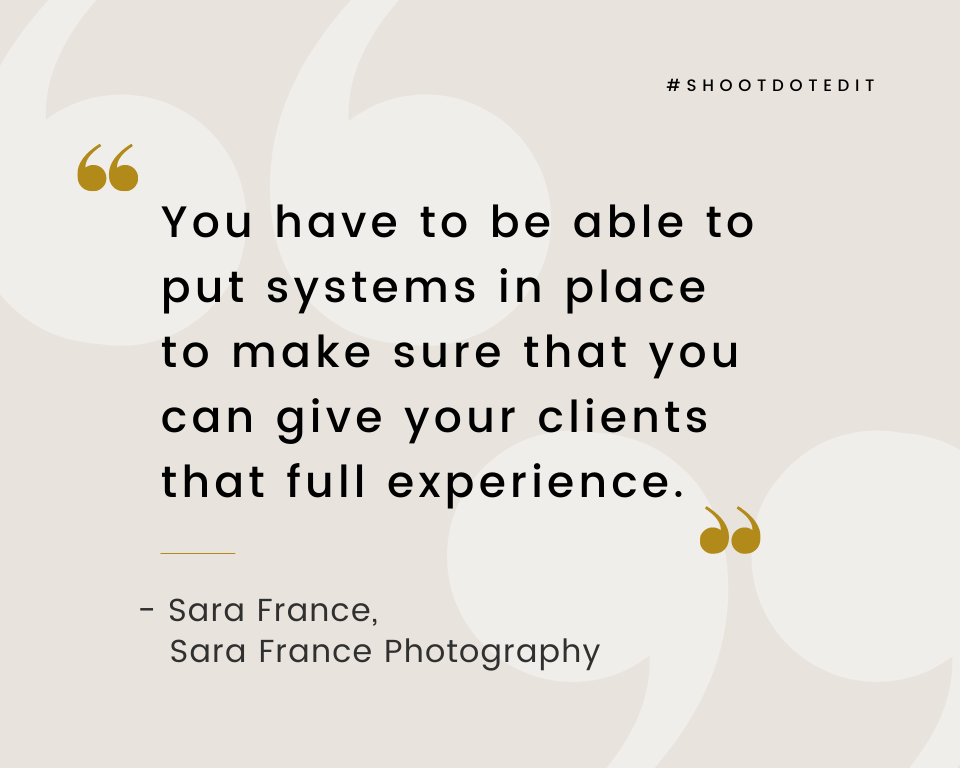
ShootDotEdit: What would you say are your best business practices?
Sara France: I think the first one is taking the time to set up Táve as a studio management software. It manages all of our leads and our workflows and our processes and it’s a beast. You have to take the time to set it up and create workflows (you can use some of theirs as well). And you have to put those workflows into the system, but it’s a very robust system. So the more you grow with it, the more it can do for you. And a lot of people just won’t take the time to get it set up and make a workflow. But Táve is a great product and it’s something that I don’t think we could do business without.
Another one is our download process – our process of making sure that we can shoot every day and have cards available and not lose images. And with multiple photographers, this becomes way more challenging obviously. So this process and just the systems for it are still something we’re continuing to grow and evolve as well. We just got a new NAS system (network access server) and we’re setting that up and I’m excited to get that on board.
Then, I think my other best practice would be my system for managing the financial side of the business. I understand (and love) spreadsheets. We have a ton of documents that keep track of who’s making money and where and how. And we have systems in place for tracking all that and making sure that our finances are good and in check. So that system took years to evolve and I do feel like we’re in a great spot now. And I feel like it’s just a lot more on autopilot. Now anybody where before it had to be me.
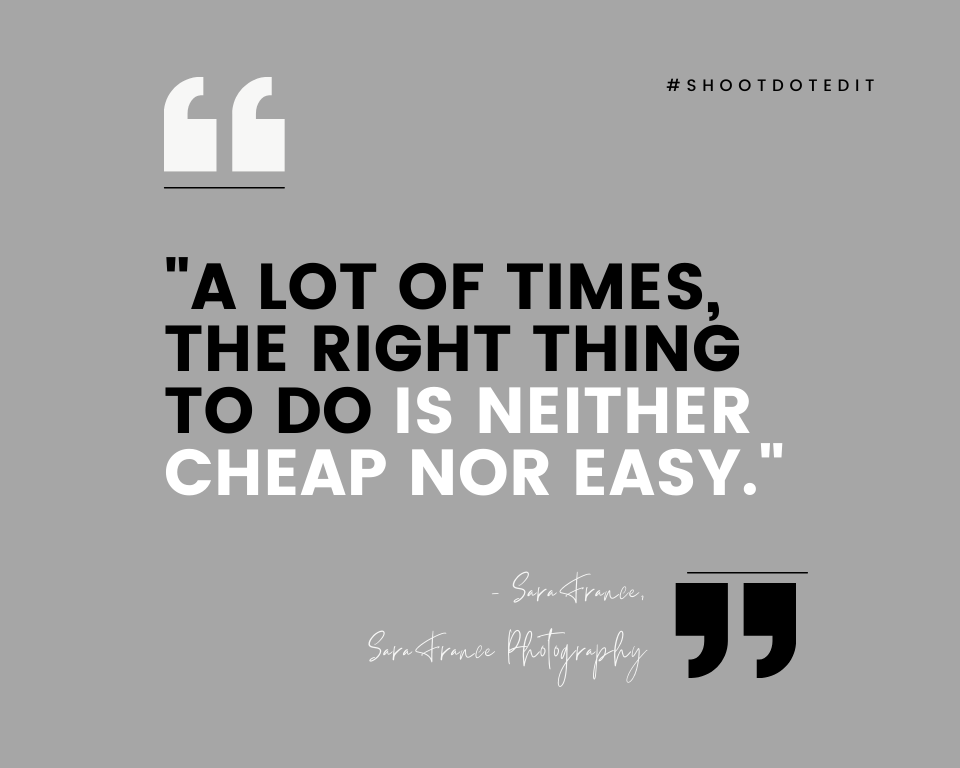
ShootDotEdit: What are your secrets to successfully running three businesses?
Sara France: Branding three separate companies is not cheap and it’s not easy. None of that sounded like a good idea to my pocketbook or my timeline. However, a lot of times, the right thing to do is neither cheap nor easy. A lot of times, people just take the easy route. If there’s a challenge or if there’s something that seems hard, but could be worth it, I’m all about it. That challenge is the hidden gem I’m looking for almost always. If it’s too hard for somebody else to do but would be great for the clients or the business, then I’m going to deep dive and try to figure out how to make that thing happen because that’s usually the secret sauce.
And honestly, I can say that a lot of the successes that I’ve had in my career are maybe because of that one character trait – where somebody else leans out, that’s usually where I lean in. When looking at the competition, I’m looking at them really to see what not to do – what is being done so that I can be different and provide something unique. And maybe that seems a little hard to do, but we make it happen. That’s why we try to lean into all of our businesses. But that’s my job in the business. I try to remove myself from the day-to-day tasks as much as possible so that I can do that part. And when I start to feel like I’m working too much in the business and I’m losing that key element that only I can provide, that’s when I start looking for more resources so that I can continue moving the businesses forward.
ShootDotEdit: After having worked with photographers on multiple levels, both as an employer and as a mentor, what do you think are the most common reasons some wedding photographers fail in this industry?
Sara France: One reason I think that wedding photographers may fail is because they don’t put a focus on relationships when it comes to marketing – the relationships that they have with their clients, vendors, and venue coordinators. You’re not only serving the client, but also the industry. And taking beautiful pictures is a piece of it, but the timing on the wedding day also has to be on-point and you have to be considerate of everybody. All of those little things make such a huge difference when it comes to whether people are going to refer you or not. So marketing-wise, my focus has always been on people and it always will be on people. Whether or not we choose to do any other kind of marketing to reach a certain demographic, we always put people first – making sure that our vendors know we’re there for them and that our clients know that we are going to be 110% there for them as well.
The second reason I think wedding photographers may fail is they have a reluctance to implement systems. That client attention I mentioned comes down to systems, because you can’t remember to always send the email two weeks before or three weeks before or the day after – all of those things that give a client that high-touch experience. You have to be able to put systems in place to make sure that you can give your clients that full experience.
Sometimes, when photographers are just starting out, they are just trying to survive. They are not spending time figuring out how to get past that point and put systems in place that are going to make a difference for their clients. I’ve just been surprised lately that there are so many photographers out there who still don’t have good systems in place in general for card download and backup and storing files. These things are really important. They can make or break your business. We are in the business of making sure that we can hold on to images and that we can deliver all of the images. And I know if anything is going to keep you up at night as a photographer, it’s going to be losing images or missing a shot. That’s the ultimate wedding nightmare. So having the assurance that the systems that I have in place for our new production manager are going to work helps me sleep stress-free at night.
Related Read: The Importance Of Implementing Business Processes In Wedding Photography: Featuring Infinite Loop Photography
Outsource To Work On The Business, Not In It
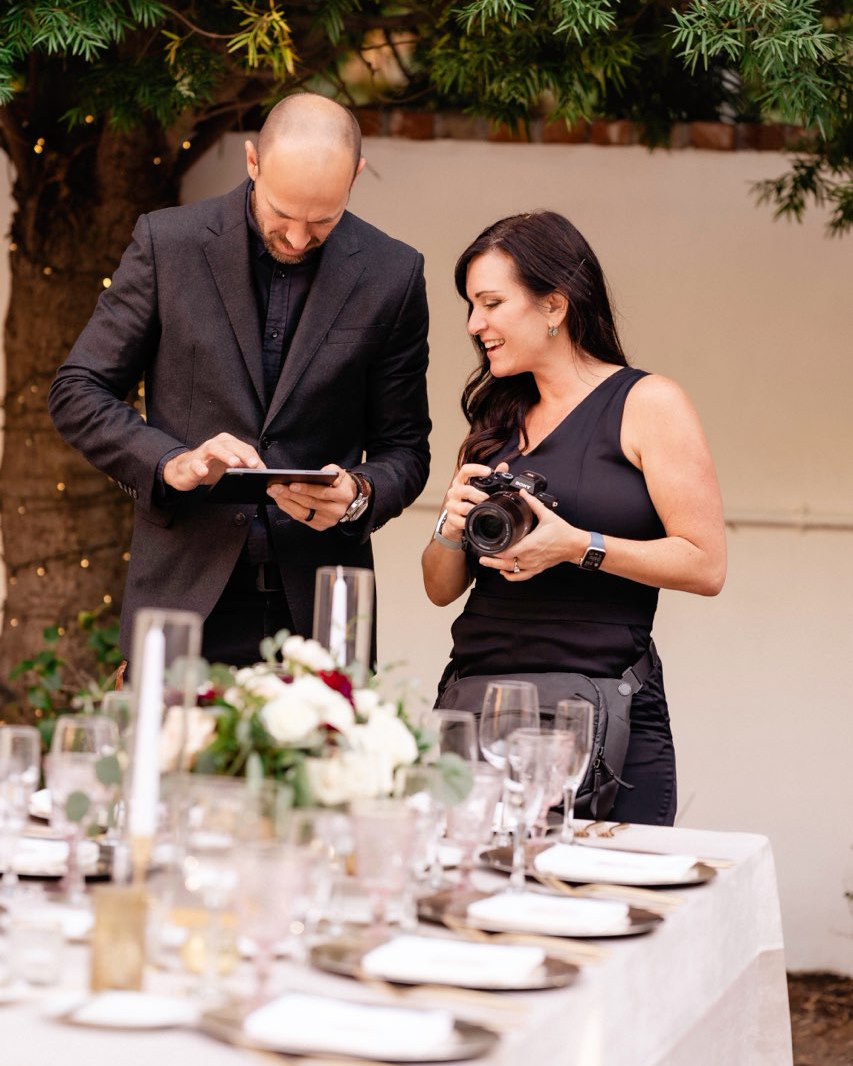
ShootDotEdit: It sounds like outsourcing is a big part of everything that you do to build stronger systems and seamlessly run your businesses. Can you shed a little more light on how outsourcing works for you?
Sara France: Photographers are overloaded. They expect themselves to do all of it. This is a full business – and you are trying to do ALL of it – marketing, CFO, CEO…and I understand that thinking. But there’s a reason that there are positions in companies and different allocations. And I understand that maybe photographers can’t afford to hire people for every position, but that’s why outsourcing is so important. Companies like Bench, Gusto, and Táve can help systemize and do those things that they are built to do, and likely better because they’re focused on that one thing they do best. There are things that you need to know as a business, for sure, but they are so time-consuming to do yourself. And I only know this because I did them myself for many, many years. But, taking the time to outsource is tough. People don’t want to stop the churn in order to figure out a better way. But that’s really what you have to do. You have to stop and really dive into solutions that make a long-term impact as opposed to a short-term impact.
So, yes, outsourcing has been key for me. Honestly, I think ShootDotEdit was my second outsourcing partner. And so I gave up editing full weddings. I was the second customer that you guys signed up! And so I knew that outsourcing my editing was really important from the very beginning. It has really allowed me to continue to expand and grow. Each of our brands has different presets and different looks. And so ShootDotEdit can manage the looks of each of our brands and the customization of each of those things, which is great. But I think that what people don’t realize is that I actually can’t edit as well as ShootDotEdit does. I don’t even know how you guys have it set up so that you can make consistency happen over 1200 images! That is virtually impossible in my mind, but somehow you make it possible. And that is important to us.
So when I look for outsourcing partners, I go through the process of making sure that I’ve got the right companies. I look for the best of the best. I look for companies that make ordering or using their products easy. And I also look at the quality of the product or specific features that we’re looking for. We are a full-service company, and we want to provide quality products to our clients. So I look for companies that make quality products that are easily accessible and make it possible for multiple people on the team to use them.
Another partner we use/outsource to is Fundy. Their software is just a great system for us and has really helped us in our album design process, and in working with our clients. It’s really user-friendly and helpful for sales. We also use Google Drive for a ton of stuff. I know a lot of people do that, but we also have leaned into G Suite. Managing so many email addresses is a challenge in itself and G Suite has been a lifesaver in that area. We also use Google Voice for business, which has been good. And then, we have amazing partners that just help us keep all of our systems in check. I’ve mentioned Táve, Bench, Gusto. We also use Pixellu for smart slideshows for our clients.
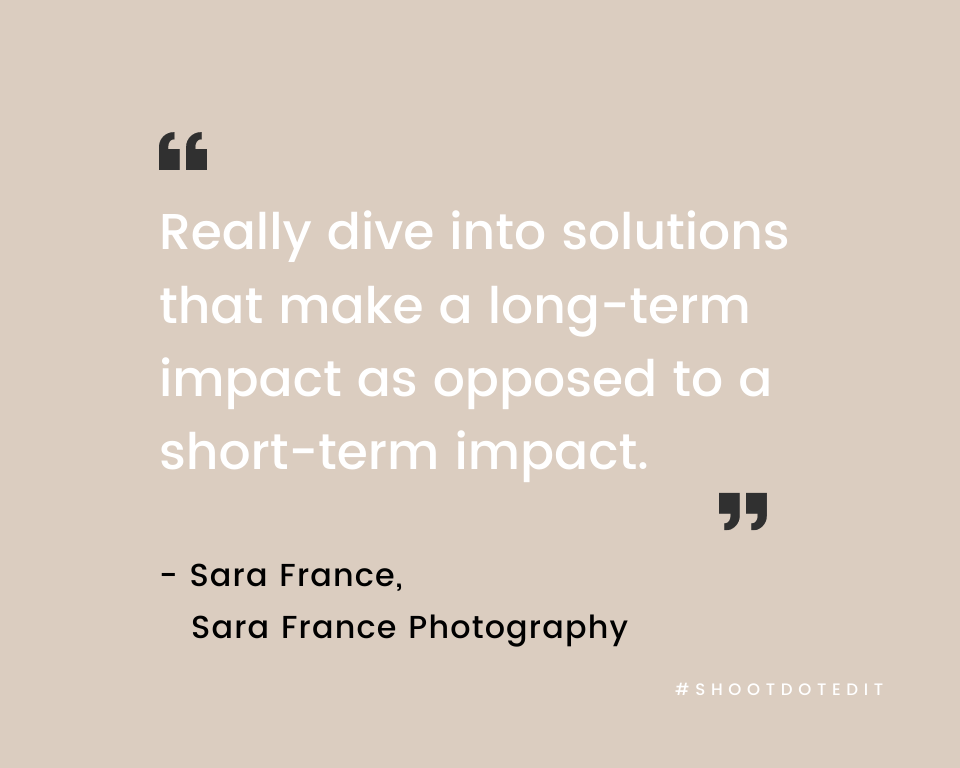
ShootDotEdit: How many of the systems that you outsource to required you to put in the work first in order to get them to where you needed them to be?
Sara France: All of them. Each of them had to have work put in. You have to set aside time to set up an outsourcing partner. No matter what, they can’t read your mind and they don’t know your business and they don’t know your preferences until you tell them. You still have to tell it ‘this is my business, these are the people who I work with’. But the difference between taking the time to set up an outsourcing partner versus just continuing to do it yourself is huge. You can get days – years! – back in your life and your business when you outsource. People sometimes wonder how I can focus so much on client relationships or how I can do speaking events and be a Sony artisan and just do all of those things – it’s all because of outsourcing and because of the people that I’ve been able to bring onto my team and how we use the systems that we have in place. So it’s a partnership.
I love the fact that outsourcing has created this opportunity that you don’t have to bring people into your space. So it opens up a whole new world where you don’t have to pay money for rent and utilities and all of those things that a lot of the brick and mortar companies have to do. For instance, with ShootDotEdit, if I was doing it myself, I’d have to hire someone, make sure they were trained, give them a place to work, and have the computers and facilities set up to manage that person. So when I outsource, all of those things get handled. It’s not just the editing, it’s not just your time, it’s managing staff and availability. And what happens if something happens to you and you can’t edit anymore? So that’s why I feel like outsourcing is so important. I would rather pay a little bit of extra money, spend a little bit of extra time to set it up, and work with a company that is good quality and will provide a good finished product rather than just go with the least expensive or the one that seems the easiest to set up.
Related Read: Professional Photo Editing: Why Outsource As A Beginner
Key Vendor Relationships
- ShootDotEdit – Photo editing
- Táve – Photography business management
- Bench – Bookkeeping and taxes
- Gusto – Managing payrolls and the hiring process
- Fundy
- Pixellu
- Google Drive and G Suite
- Strengths Finder – An evaluation book for managing your business
- Sony Artisans of Imagery
- Sony Alpha Female Program
Go-To Gear
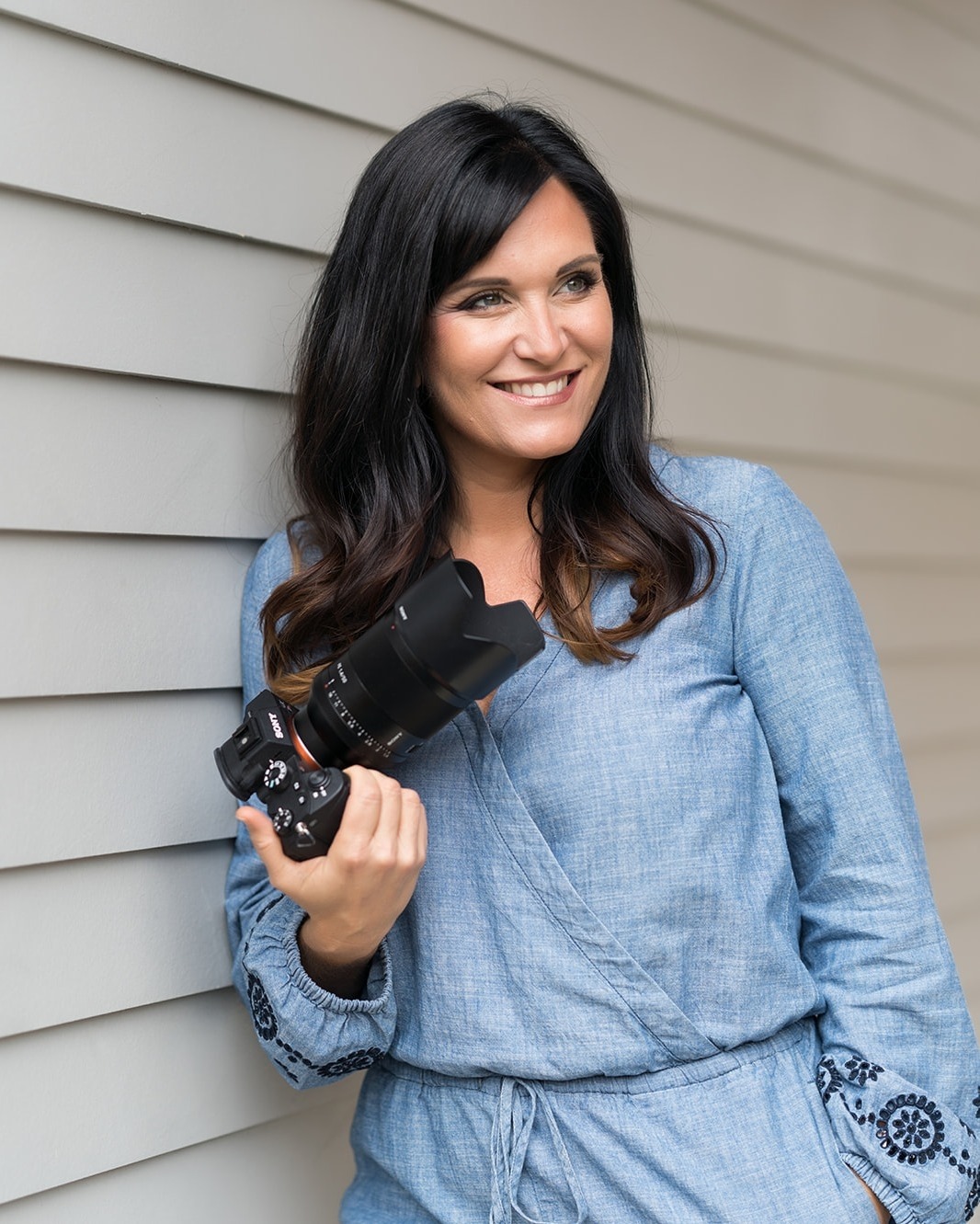
ShootDotEdit: We know that you love gear! So can you share with us a bit about your go-to gear?
Sara France: I have a couple of things that I love. I’m a Sony artisan and my Sony gear is absolutely the best. There are a couple of things that completely changed the way I shot when I started using Sony. First, the technology behind their cameras is amazing. Sony has been on the cutting edge of mirrorless and on the cutting edge of so many of these little features that we didn’t know we needed and big features that we knew we needed. And that has been a real game-changer for me when it comes to my photography.
Second, I’ve been shooting for 20 years and gear is heavy. But the Sony gear is so much lighter than anything I’d ever used before so I think using Sony has elongated my career and has allowed me physically to be able to be a photographer for longer because it’s not as wearing on my body. I just got the Sony A1, which if you’re a Sony person, it’s like the creme de la creme of cameras. I love shooting with it, it’s a great camera.
Then lighting-wise, a light company that I’ve loved so much lately – because I’ve started shooting big weddings again – is StellaPro Light & Motion. Every time I shoot a wedding the videographers love that I shoot with continuous light because it’s teamwork. And the StellaPro lights put out a good amount of beautiful and consistent light. We use it a ton for just creating what looks like a nice window light without bringing in a huge softbox.
Suggested Read: Best Wedding Cameras: A Comparative Analysis
ShootDotEdit: Do you think you will ever stop shooting to completely pivot towards either mentoring, building businesses, etc., or is shooting always going to be a part of what you do?
Sara France: It’s really hard for me to imagine not shooting. I think the only reasons I would stop shooting would be if it wasn’t in the best interest of the clients or if I just physically couldn’t do it anymore. There is such a balance for me in energy and then passion and excitement around shooting. Not being able to shoot during the pandemic was depressing. It was hard emotionally. The first wedding that I shot after the pandemic restrictions were lifted was so emotional for me – and for everybody there to be honest. On the commercial side of things, honestly, I’ve gotten attached to helping people launch their products. And I love working with new entrepreneurs on helping them launch their dreams and passions in photography. And we work closely with designers and other companies that can help them bring their product to market and show it in the way that they envision it. And those things are things that I’m passionate about too. So I don’t envision myself just doing one or the other.
ShootDotEdit: In the end, we are sure some of our readers would love to learn more about you and your businesses. Can you share where they can find you?
Sara France:
- Sara France Photography: Website, Facebook, Instagram, Pinterest
- The Copper Collective: Website, Instagram, Pinterest
- Shay Studios: Website, Instagram
We want to extend our thanks to Sara France for taking the time out of her schedule to share her journey as a photographer and as an entrepreneur with us. Her commitment towards her art and her undeterred will to continue building successful photography businesses, and overcome any challenges that come her way, are truly commendable. And we are sure that it will inspire our readers who look forward to walking in her footsteps.
Further Read: Celebrating Women Who Tell Our Stories
Here at ShootDotEdit, we love telling stories that talk about passion, practice, and persistence. And we think Sara France’s journey lives up to all that and more. Just like her, we also look forward to helping the photography community grow and evolve. We do that by reducing your post-production workload by doing your photo editing for you. To learn more about how can help, check out our pricing plans!


Leave a comment